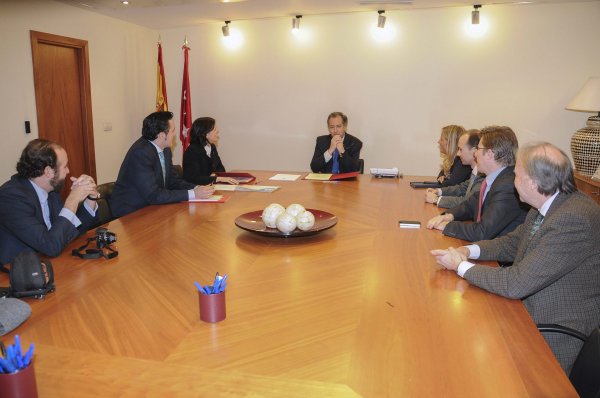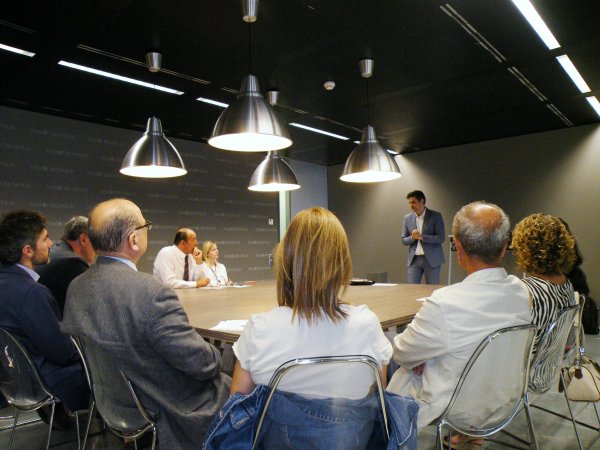Business Culture: Business Meetings
While Spain’s official language is Castilian Spanish, Basque, Catalan, and Galician are still spoken. Most Spanish businesspeople speak some English, but there are occasions where you may need an interpreter. It is best to ask in advance whether an interpreter will be needed, in order to avoid causing offense.
Spain is divided among 17 different ethnic groups, each with its own region, dialect, and culture. The five ethnicities with the most social, political, and economic clout are the Andalusians, the Castilians, the Basques, the Catalans, and the Galicians. Each region has developed its particular industrial niche. In some cases, an interpreter may be needed during a business meeting to help navigate the cultural nuances among the different ethnicities.
Be prepared to adopt a relaxed attitude toward scheduling and deadlines when conducting meetings with Spanish businesspeople. Also, establishing a friendly, somewhat personal relationship with your Spanish counterparts is crucial.
Preparation
The Spanish prefer to do business with people they know and trust. You will need to invest a lot of time into building a relationship. Initial contact via phone or e-mail will not be very effective; it is best to engage a local contact to arrange an initial face-to-face meeting. You may need to visit the company several times before beginning a business transaction. A letter of introduction from an executive of a company that has done business with the company you are interested in, or from a close mutual friend, may be very helpful.
While people usually send agendas in advance, it is best to be relaxed about them, as they are usually a just a general guideline and will not be strictly followed. You should provide details on the meeting attendees’ roles, positions, and professional background ahead of time, as Spaniards will want to know whom they are meeting with.
Attempts to communicate in Spanish will be received with enthusiasm, so try to familiarize yourself with some useful phrases:
| English | Spanish |
|---|---|
| Good morning | Buenos días |
| Good afternoon | Buenas tardes |
| Good evening | Buenas noches |
| Hello | Hola |
| Thank you | Gracias |
| You’re welcome | De nada |
| Goodbye | Adiós |
Scheduling
The Spanish have a relaxed attitude to schedules and deadlines. They believe it is a waste to work overtime at your job while forsaking other areas of life, such as family and leisure. Offices generally open at 9a.m. and close at 1:30 or 2p.m. for a siesta break, after which they open again from 4:30 to 8p.m. During the summer months of July and August, they may not be open in the late afternoon at all. It is best to schedule the initial meeting for midmorning, as the workday tends to start leisurely, with staff chatting and catching up on office gossip over coffee.
You should schedule your meeting well in advance, but make sure to reconfirm the day before, as it is not uncommon for meetings to be rescheduled, or bumped in favor of other appointments. You should arrive on time to meetings in order to convey the seriousness of your intent, but expect to be kept waiting for 15 to 30 minutes. Do not display irritation or annoyance, as it will put you in a bad light.
It is essential to check local and national calendars before scheduling a meeting. Workers have 30 days’ paid vacation, usually taken during August or around Easter time. Spain also has about a dozen public holidays, some of which are national and others regional. As a deeply Catholic country, Spain observes many holidays related to religious dates, such as Corpus Christi, the Feast of Epiphany, and the Feast of the Immaculate Conception. If a public holiday falls on a Tuesday or Thursday, Spaniards may take four days off as a long weekend. Different towns and villages also have annual fiestas that can last for several days.
Business Attire
For Spaniards, looks do matter, and the way you dress is a reflection of your company status, proficiency, and success. Men should wear good quality, dark-colored woolen or linen business suits with silk ties and white shirts, while women are expected to dress in well-cut pants or skirt suits. Hair should be well styled and neat. Women should not wear clothes that reveal too much flesh. In the summer, it becomes more acceptable to wear lightweight suits, and to remove your jacket when going outdoors. It is usually best to follow the cue of your Spanish counterpart.
Meeting Protocol
Entering the Meeting Room: Hierarchy
Upon entry, formal greetings and warm handshakes are exchanged with everybody in the room. You should greet the most senior member first. Spaniards always give the greeting hola (hello), buenos días, or buenas tardes (good morning or good afternoon), or just buenas for short. Upon leaving a room, Spaniards say adiós (goodbye).
Introductions
A member of the Spanish company will formally introduce you and your team to the most senior executive person in the room. The executive will usually make a brief welcoming speech, and will then give you the chance to make your presentation. People also shake hands upon leaving the room.
Forms of Address
Always use the appropriate formal title of Señor (Mr.), Señora (Mrs.), or Señorita (Miss), followed by the surname. The respectful titles Don or Doña, followed by the first name, which are used when addressing an elderly or senior man or woman, are becoming increasingly rare and are used only on official documents. Avoid using these in business situations, as it may look like mockery or sarcasm. Spaniards carry both their mother’s and father’s first surnames. You should use both when addressing someone, unless you see that the person is generally known by only one surname.
Business Cards
The exchange of business cards is an essential step of a business meeting, so be sure to bring more than you think you will need. It is a good idea to have one side translated into Spanish. It is important to print your professional title and position in the company, particularly if you have the power to make decisions. When handing over a business card, make sure that the Spanish side is facing the recipient. Upon receiving a card, smile, maintain eye contact, and take a few moments to look at the card. Place it on the table in front of you.
Body Language
Spaniards tend to converse at a distance of two or three feet apart. Their body language and gestures are expressive. Physical contact, such as a pat on the back, shoulder, or arm, is common between people of the same sex. Eye contact should be steady, as this conveys trustworthiness. When gesturing toward an object or person, use an open hand rather than pointing with your finger. A smile may sometimes be used to mask anger.
Meeting Starters: Small Talk versus Getting Down to Business
Initial business meetings always begin with at least 30 minutes of general conversation. Topics can involve the weather, local attractions, your trip, your home country, and your family, especially your children. This is an important step, as it allows your Spanish counterparts to get to know you better and gives them the opportunity to size you up. Do not try to hurry the process or try to advance your agenda before everyone is ready, as this will only make you come across as ill mannered and impatient. It is important to be patient, and to let your hosts set the pace.
Conducting the Meeting
You should come to the meeting completely prepared. Your presentation should be clear, well explained, and backed up with visuals, demonstrations, and samples. You should provide extensive details about prices and quality of the product, as this information will be passed on to the decision maker later on.
The Spanish are impressed with eloquence, so try to incorporate flowery language in your style. Let your company or product's track record speak for itself, as the Spanish do not respond well to boasting.
If you don't have an interpreter present, it is important to use clear, concise sentences, without any slang or jargon, and leave sufficient pause for understanding. Spaniards feel uncomfortable admitting when they don´t understand. Translating your materials into Spanish will be appreciated.
Avoid speaking openly about profit making, and focus on the business relationship. While Spanish businesspeople are competitive bargainers and want to make a profit as much as anyone else, they prefer to focus on long-term friendship and commitment, and will come up with a deal that will work for everyone involved.
Saving face is extremely important, so Spaniards avoid confrontation, and do not like to openly disagree with you. Instead of "no," they will say things like "we´ll let you know" or "maybe." It is important to watch out for nonverbal cues, such as averting the gaze and long pauses, and to read between the lines. It is advisable to consult with one of the Spanish meeting participants in private to clarify what was said.
Interruptions and digressions during business meetings are normal, and they are not intended to be rude or to show lack of interest. Meeting participants may converse among themselves in Spanish, not to shut you out, but to make sure that what you said is being understood.
Decision Making
The business hierarchy is well defined, and only the most senior person in the company makes decisions. While this person will base decisions on reports produced by other departments, he or she will not consult with lower-level staff. Very often, you may be dealing with a mid-level manager, who will pass detailed reports onto the decision maker. It is important to take the time to establish a good rapport with both the senior executives and the mid-level managers.
Gifts and Splitting the Bill
Business lunches are popular in Spain. Business is not usually discussed at these meals, and when it is, it is usually after coffee. Before extending or accepting an invitation, you may need to acclimatize yourself to your counterpart’s schedule. Breakfast meetings are not popular, as Spaniards like to start the day a little later. Businesspeople may also prefer to go home to their families for lunch. Lunches can either be brief meetings at local cafés, or long, drawn-out affairs at a fine restaurant. Dinner is often not eaten until 9 or 10p.m., and can continue well after midnight. As in many countries, the person who does the inviting pays the bill. Be sure to reciprocate at some later point.
Gifts are usually given only at the end of business transactions. They are opened immediately, in front of the giver. Your gift should be of good quality and beautifully wrapped. Good brand names are appreciated, as well as items from your home country, such as a coffee-table book or special artifacts. If you are invited to your colleague’s home, chocolates, pastries, or fine liqueur make good gifts. If you give flowers, avoid giving dahlias, chrysanthemums, red roses, or white lilies, and make sure the blooms don’t add up to the number 13.
Follow-up
Meeting summaries are a good way of verifying what was said during a meeting. Summaries or key points of the meeting can be sent in a follow-up letter or e-mail the next day.
Once a deal is consummated, the highest-level person at the meeting will often delegate its implementation to subordinates. Find out who the executors are, how they want to be contacted, what needs to be done, and when. A follow-up of about one week is appropriate, and may be expected. It will also serve to consolidate the business relationship. It is also a good idea to send a letter or e-mail thanking your business associates for their time.
Copyright © 1993—2024 World Trade Press. All rights reserved.

 Spain
Spain 

